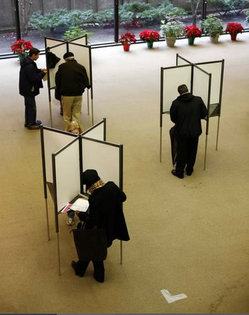 WHAT WE HOLD MOST DEAR
WHAT WE HOLD MOST DEAR
As lay Catholics struggling to be faithful to the call of our bishops, we have arrived at the following judgments.
Fr. Giussani taught us that in front of life's real problems and challenges, what we hold most dear surfaces. Thus, within the privacy of the voting booth we will see "whether faith is really in the foreground, whether faith truly comes first, whether we really expect everything from the fact of Christ or whether we expect what we decide to expect from the fact of Christ."
We welcome the opportunity to vote as an educational one that will allow us to witness to what we hold most dear. We do not hope for salvation from politics or politicians. Yet we understand the critically important role that politics plays in our common American life.
For this reason two concerns matter most to us and we will vote according to which candidates and parties demonstrate an authentic care for these concerns.
First: Freedom of Religion. Political power must recognize faith's undeniable contribution to the defense and broadening of human reason and its promotion of authentic human progress. This is a guarantee of freedom for everyone, not only for Christians. And this freedom must include the freedom to speak, convince, act, and build in the public square; religious freedom relegated to one's private life is not religious freedom at all.
Second: The Common Good. Those who hold political power must do so as a service to the common good of the entire nation.
 We consider the recognition and defense of three self-evident truths regarding human beings the minimum commitment to the common good: the right to life from conception to natural death; the irreplaceable value of the family, founded on the marriage between a man and woman; and freedom of education.
We consider the recognition and defense of three self-evident truths regarding human beings the minimum commitment to the common good: the right to life from conception to natural death; the irreplaceable value of the family, founded on the marriage between a man and woman; and freedom of education.
For the common good, we further seek politicians and political parties that value subsidiarity, a partnership between the public and private sectors facilitated by a robust non-profit sector. At the same time, we seek persons engaged in politics who recognize that subsidiarity can never annul the solidarity we owe to all our brothers and sisters living in this nation. There is no care for the common good that ignores basic human needs of millions in our nation.
These judgments will determine our support for particular candidates and political initiatives in the upcoming elections.
September 2008
Communion and Liberation - USA


Leave a comment